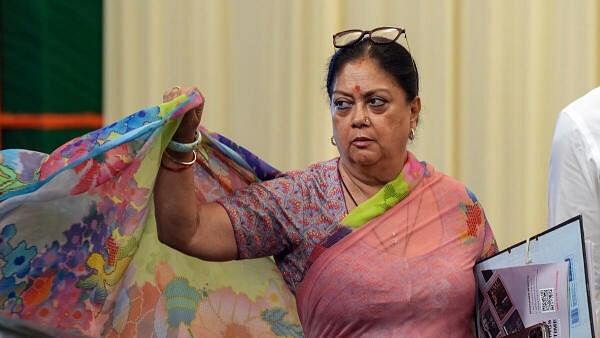
BJP National Vice President Vasundhara Raje.
Credit: PTI Photo
The feudal order survives in Rajasthan in ways that cannot be seen elsewhere. There is, for instance, the matter of a rani, two-term Chief Minister Vasundhara Raje, who has been removed from her perch in the Bharatiya Janata Party (BJP) and is one among four commoners now showcased in the party’s election posters. It’s another matter that the largest display is the visage of Prime Minister Narendra Modi, who is also the party’s most popular leader, and floats higher than any dynastic king, queen or prince.
For those who do not know, Vasundhara Raje is from the Scindia family of Gwalior, which always consciously uses titles such as Rajmata, Maharaj, and Maharani even as they have been active in politics, both in the Congress and the BJP, both at the national level and in Madhya Pradesh. The Rajasthan linkage comes from Raje having married the Maharaja of Dholpur, a union that lasted briefly; but her son Dushyant Singh is the Yuvraj of Dholpur and a BJP MP.
Being a queen would have given Raje a head-start, but she did evolve into a successful politician, navigating the state’s male-dominated politics, nurturing loyalists in the party, and a following among the people. The Modi regime may have passed the women’s reservation Bill, but the party seems structurally unable to give due regard to the only woman leader who can be defined as a mass politician in the BJP. It can be said that the late Sushma Swaraj was the most significant woman in the BJP’s history. High-profile politicians such as Smriti Irani are popular candidates in particular seats, but by no stretch are mass leaders.
Indeed, all political parties seem to have a problem with authentic leadership by women, unless they are the wives and daughters of a political dynasty that controls the party. The sole woman Chief Minister now in India, West Bengal’s Mamata Banerjee founded her party, the Trinamool Congress. Two powerful women politicians, the late J Jayalalitha from Tamil Nadu and Mayawati of the Bahujan Samaj Party (BSP) from Uttar Pradesh, both chief ministers multiple times, got their initial momentum from being associated with men who founded the parties, MGR in the case of the All India Anna Dravida Munnetra Kazhagam (AIADMK) and Kanshi Ram, the founder of the BSP. That said, both women were high achievers in their own right and genuine mass leaders.
Were it to win in Rajasthan, it’s not clear how the BJP will choose a Chief Minister, but hypothetically Raje could be one of the candidates. Were a gender card to be played, it’s worth noting that the BJP high command has another queen, Diya Kumari, of the House of Jaipur. She is a one-term MLA, and currently an MP. She has not only been put forth for the assembly elections but has also reportedly had a say in choosing some Rajput candidates — as she is highly placed in the pecking order of her caste group. Kumari describes herself as a princess who works for the people (never mind that royalty was abolished in 1971). It is also said that there is no love lost between her and Raje.
Princesses stepping out of their palaces to mingle with the people make for a benign fairytale within the framework of feudalism. But there is an ugly and violent side to this as well that involves upper-caste oppression and atrocities. Take the case of Girraj Malinga, a three-term Congress MLA, who has now joined the BJP. Briefly, in March 2022, a Dalit engineer with the power department, Harshadhipati Valmiki, was mercilessly beaten by Malinga and his men, reportedly because he switched the power off in their area of influence for non-payment of dues. Valmiki is still in hospital as multiple bones were broken and he was left for dead.
According to his account, Malinga used casteist slurs, threw a chair at him, and stood on his face while his men beat him and broke bones. An FIR was registered but no chargesheet was filed. Sources reveal that Chief Minister Ashok Gehlot reportedly wanted to give a ticket again to Malinga but Dalit groups raised the issue and Rahul Gandhi reportedly threatened to not campaign in Rajasthan if that happened. Therefore, the BJP snapped him up and promptly gave him a ticket — so much for justice for Scheduled Castes.
But on most other matters Gehlot has had his way. One of the consequences of this has been the continual undermining of Sachin Pilot. The Congress must know that one community that also tipped the scales for them in the last 2018 election were the Gujjars, who do see Pilot as their leader. Besides, Pilot had greater control during the last campaign as he was then state unit chief. His 2020 rebellion behind him, Pilot has mended fences with the Gandhis and is active in the current campaign. He has a profile larger than his caste group. Yet, travelling through Rajasthan, it becomes clear that Gujjars have mostly decided to shift away from the Congress, often because they believe that Gehlot has undermined their most significant youth face, and they wish to punish him. This can damage the Congress, but should Gehlot win despite such ruptures, he would have done so as an organic OBC leader, on the back of some good welfare schemes.
There is nothing feudal about either Gehlot or Pilot as they are people’s politicians who are not royalty. In the razzmatazz of a Rajasthan election, there is a curious mix of kings, queens, dons, and leaders from the ground up. It is never short on colour and drama — but feudalism lives on.
Saba Naqvi is a journalist and author.
Disclaimer: The views expressed above are the author's own. They do not necessarily reflect the views of DH.